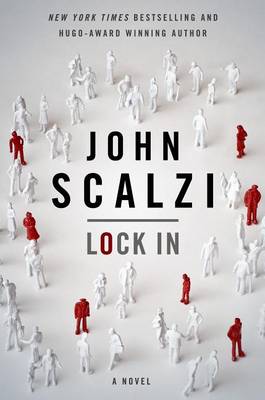Reviewed by Melanie on
Review originally posted at RabidReads.ca.
I listened to my first book by John Scalzi when I read an Audible freebie, The Dispatcher. I have seen a few reviews for Lock In when it was first released, so when I saw it as part of a Two for One deal, I quickly grabbed this story up. I’m really glad that I did.
Like The Dispatcher, this is more of a cop drama with science fiction elements to it, than straight up sci-fi. In this world, people are suffering from Haden’s syndrome. It is the result of a severe flu like disease that spread around the world and left people in a state of “lock in”. This is where the mind is fully functional, but the body and mind can’t speak to each other. The body functions, breathes, digests, etc., just fine, but the mind can’t make the body talk, walk, move. So people created “threeps”. They are robot bodies that their minds can control. They’re named after C3PO.
So in this story, we follow FBI agents Chris Shane, who has Haden’s and a rookie, and Leslie Vann, who isn’t a Haden and a veteran agent. They are assigned cases primarily to do with Haden’s victims or any crime related to Haden’s. They go to a scene where an integrator (a person with a neural network in their head to allow Haden’s victims to control a human body for a time) appears to have killed someone. Question is, was it someone using the integrator’s body who killed someone or the integrator himself?
There is a lot that Agents Shane and Vann figure out throughout the search for this killer. This goes way deeper than they ever could’ve imagined. I had a really good time following this pair as they tracked down the killer. This story had everything I could’ve wanted. There is a great police procedural story, wonderful characters, a great mix of science fiction, all in just the right mix to make for a very intriguing story. I’ve very excited to see that there is another book in the waiting with Shane and Vann. If you’re looking for thriller with science fiction and/or police procedural aspects to the story, this is a great one for you.
I will also add, that this audiobook also included the prequel novella that goes into how Haden’s syndrome came to be. It is written kinda like a documentary, as in there are many points of view including actual patients, nurses, scientists at the CDC and more. While, I didn’t enjoy this as much as the full story, it was a nice addition to learn more about this disease. It is also narrated by a full cast and not Wil Wheaton.
Narration
I’ve seen Wil Wheaton listed as the narrator for a few stories, but this my first time listening to him. I really liked his take on the male characters, I just didn’t like his female voices. It was almost like he didn’t even try to make them feminine (which I would rather have than an overly high pitched and shrill that I’ve heard some male narrators do). It wasn’t horrible, just not as good as some of the other male narrations that I’ve listened to. He did a really great job with the male voices and all the other parts of the narration (which was most of the story. There aren’t a ton of females in this story).
Reading updates
- Started reading
- 2 August, 2017: Finished reading
- 2 August, 2017: Reviewed
